New Tech Update Videos on MCAA.org
Don’t miss the new short tech update videos developed jointly with BuiltWorlds for MCAA members. Stay ahead of the change curve!
Don’t miss the new short tech update videos developed jointly with BuiltWorlds for MCAA members. Stay ahead of the change curve!
MCAA’s 2017 Field Leaders Conference (Denver, May 10-12) provides foremen and superintendents with the management and leadership skills they need to be effective in managing jobsite labor, other personnel and operations to keep projects on time, on budget and profitable. Act now while space is available.
Field leaders play a key role in making sure that projects run smoothly and efficiently, and their abilities as leaders and managers determines their success. However, those who rose from the craft labor force to their position may not have sufficient skills to properly motivate project staff and labor, solve project problems quickly and effectively, relate positively with customers, suppliers and colleagues and develop and implement strategies that will increase productivity and profits. And, they may not think of themselves as a professional and a member of your management team, which may affect their interpersonal as well as their project management actions and decisions.
Helping your field leaders understand their importance and value to your business and its bottom-line is an important objective of this conference. They will learn the skills needed to be an effective people motivator rather than a punisher; a proactive planner rather than a knee-jerk responder; a team leader rather than a team member; a skillful communicator, listener, and arbiter rather than a my-way-or-the-highway dictator; and a business-and results-oriented manager focused on growing your company’s profits and brand.
Your field leaders will understand:
Not certain if your field leaders will benefit? Here is a sampling of comments from the 2016 class:
Don’t miss your chance to train your personnel at the Denver Field Leaders Conference. It will sell out quickly.
The Airconditioning, Refrigeration and Mechanical Contractors Association of Southern California, Inc. (ARCA/MCA of Southern California, Inc.) made a $1,000 contribution to the Mechanical Contracting Education & Research Foundation (MCERF). This brings ARCA/MCA’s total MCERF contribution to $11,000.
ARCA/MCA Executive Vice President, Richard J. Sawhill, said that the Board and members of the association perceive great value in the work the Foundation does on behalf of the industry and that he looks forward to working with the Foundation for years to come.
members of the association perceive great value in the work the Foundation does on behalf of the industry and that he looks forward to working with the Foundation for years to come.
Mark Rogers, MCERF’s President, thanked Sawhill for ARCA/MCA’s involvement with the Foundation.
For more information on MCERF, contact Dennis Langley (dlangley@mcaa.org).
MCAA’s safety training video Pre-Task Safety and Health Planning for Supervisors is one of six mechanical construction supervisor safety training videos that are available to you as a benefit of membership. The video describes the benefits of pre-task safety and health planning and walks supervisors through the quick and easy planning process.
If you’re looking for a well-qualified student to hire as an intern or to fill a full-time professional position, MCAA has yet another resource to help you with your search—MCAA’s Student Chapter Contacts list.
The list provides complete contact information for each MCAA student chapter’s faculty advisor and local association sponsor. A chapter’s advisor can suggest well-qualified students as potential candidates for employment opportunities, and they’re very willing to help. And, check with the chapter’s local association sponsor, who might be able to offer recommendations.
Go to MCAAGreatFutures.org for other helpful resources. A map of all MCAA student chapters will show you which colleges and universities have established programs. And, once you get a lead on a great candidate, search our resume postings on the same site for that promising student.
Good luck!
OSHA recently released compliance guidelines covering several provisions in its revised recordkeeping rule. The guidelines address industry questions and concerns about the rule’s employee involvement and prohibition against employee discrimination provisions. The provisions affect employer safety incentive programs, and mandatory post-incident drug testing requirements. There is currently litigation that may ultimately impose an injunction on the entire rule, or parts of it. However, a ruling is not expected until later next year. MCAA encourages all affected employers to be in compliance with the rule by December 1, 2016.
MCAA’s growing family of student chapters at colleges and universities around the country has increased by two—one at Missouri State University in Springfield, MO and another at the University of Alaska-Fairbanks in Fairbanks, AK.
The Missouri State University Chapter of the Mechanical Contractors Association of America is sponsored by the MCA of Greater Springfield, Missouri. Prof. Jacob Nelson, an instructor with the Department of Technology and Construction Management, is the chapter’s faculty advisor. Bryan Fielder, president of Springfield Engineering Company in Springfield, MO led the effort to organize the chapter.
The University of Alaska-Fairbanks is the home of the UAF Student Chapter of the Mechanical Contractors Association of America. The MCA of Fairbanks is the sponsoring association, and Prof. Daisy Huang with the Department of Mechanical Engineering is the faculty advisor.
Both chapters will receive their charters at MCAA 2017 in San Diego, CA during the Awards of Excellence Breakfast. Both chapters will be eligible for the Emerging Chapter Grant and scholarships.
Congratulations and welcome!
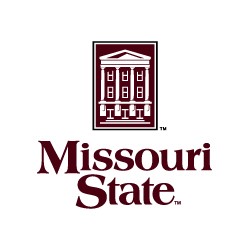

OSHA’s new standard on Respirable Crystalline Silica requires employers using alternative exposure control methods to establish and regularly update a written exposure control plan for each applicable construction operation. Compliance is easy and cost effective for members with MCAA’s new Model Silica Exposure Control Plan for Mechanical Construction.
While nobody likes constant change, there usually comes a time for your company when you feel like you have to make a decision to stay with the same software or make a break. It is never an easy decision or one that should be taken lightly. If you visited the tradeshow at the MSCA Conference or the MCAA Virtual Tradeshow, you see new features in service software that grab your attention and you think about how nicely your company could operate with that newer, shinier software package.
 Then you think about how much time and effort you have invested in what you are using. You think about the hard road ahead to shake up your operations and train staff to use it effectively. You think about how much time and money you have invested in the system you are using now, and if it is worth starting over with something else.
Then you think about how much time and effort you have invested in what you are using. You think about the hard road ahead to shake up your operations and train staff to use it effectively. You think about how much time and money you have invested in the system you are using now, and if it is worth starting over with something else.
Let’s be clear, you are not married to your software. Nobody gets bonus points for loyalty to a line of code. It’s important to keep your eyes open if you want to stay competitive.
Still, most service contractors rarely act on those impulses to leave the software they know, and the company that produced it.
According to the new MSCA Field Service Software Report, released at the MSCA Conference as part of the ongoing MCAA Technology Series, researchers from JB Knowledge found that more than 55% of MSCA contractors have been using their current service software for more than 10 years. That’s an admirable level of dedication that exceeds most Hollywood marriages. What’s more amazing is that if you dig deeper in the numbers, you find that nearly 10% of those surveyed have been using their service software for more than 20 years!
But is this a bad thing? At first glance, you might say to yourself, ‘That is too long to be sticking with the same solution.’ This may or may not be true. Many functions of the software evaluated are very similar to each other. Most integrate with apps for tablets. Most tie into accounting software. The key is in the details. There are different levels of integration that require a varying amount of manipulation and oversight.
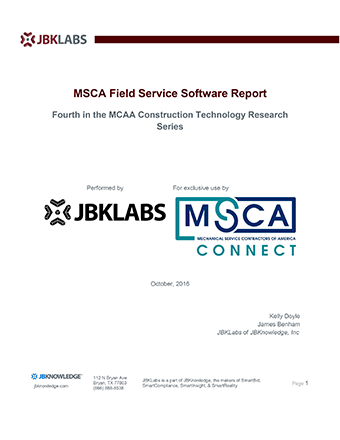 For example, if your software requires you to perform a daily export and then to import your field tickets into your accounting package, those are two extra steps. That not only means extra work, it means an extra chance for errors. Seamless integration into your accounting software saves steps, errors and headaches.
For example, if your software requires you to perform a daily export and then to import your field tickets into your accounting package, those are two extra steps. That not only means extra work, it means an extra chance for errors. Seamless integration into your accounting software saves steps, errors and headaches.
So, it might be well worth your time to take a look around. Read the report and see what each option has to offer. The report is a complimentary part of MSCA and MCAA membership. If your current software is ticking all the boxes, you’ll have reinforced your decision with due diligence. But if you can save your company and your employees hours of frustration, you’ll be glad you did before another 10 years roll around.
MCAA’s 2016 Collective Bargaining Seminar aimed at improving bargaining relations, the effectiveness of terms and conditions to improve project performance, and achieving the ultimate goal of improving MCAA and UA market share.
Starting off the conference was Richard Barnes, former Director of the Federal Mediation and Conciliation Service (FMCS). He led a panel discussion with Dave Davia of the MCA of Colorado and Frank Wall of PMCA of Oregon concerning their efforts with their local UA partners to address bargaining issues, improve labor relations and affect project owner and public agency industry issues on behalf of their members who share a strong interest in gaining market share.
Carey Peters, Director of the Construction Labor Research Council (CLRC), detailed ways to track wage and benefits settlements and trends, assess competing open shop wage and benefit levels and trends, analyze the costs of terms and conditions of the collective bargaining agreement (CBA) and objectively assess market share in local areas. This information will be used as a strong factual predicate for sound mutual interest bargaining for labor and management to accurately assess and improve market performance and market share.
Comprehensive Legal Analysis in Three Parts
Relying on the in-depth legal analysis in the 2016 Edition of the MCAA/Ice Miller Collective Bargaining Guide and Legal Analysis that was provided to conference attendees in advance of the conference, Mike Boldt and Ryan Poor, partners of the Ice Miller law firm (Indianapolis, IN), divided their comprehensive legal presentation into three discrete parts:
New laws and Labor Department Regulations
Five new Labor Department initiatives that will impact collective bargaining, employment administration and trust fund implementation in the coming year were covered.
Proposed new written affirmative action regulations for registered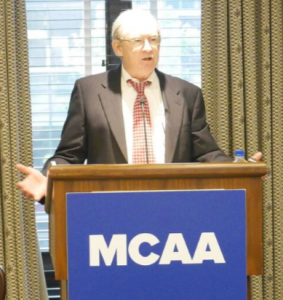 apprenticeship programs were detailed by UA and International Training Fund counsel Lou Malone and MCAA General Counsel John McNerney. Unless regulatory impediments surface after the election, employers and apprenticeship programs can expect to adapt to new written affirmative action plan requirements for registration of women, minorities and workers with disabilities into JATC programs during the coming year.
apprenticeship programs were detailed by UA and International Training Fund counsel Lou Malone and MCAA General Counsel John McNerney. Unless regulatory impediments surface after the election, employers and apprenticeship programs can expect to adapt to new written affirmative action plan requirements for registration of women, minorities and workers with disabilities into JATC programs during the coming year.
U.S. Department of Lab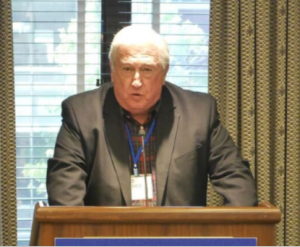 or (DoL) officials briefed the conference on a variety of new regulations set to come out next year and possibly in 2018. Bob Batista, former Chairman of the National Labor Relations Board, introduced a panel of officials from the Labor Department, including Sharon Block, Senior Counsel to the Secretary of Labor. Ms. Block noted that the Administration’s Fair Pay and Safe Workplaces Executive Order (EO13673) had recently been suspended by a federal court in Texas. She also said that the EO was expected to be
or (DoL) officials briefed the conference on a variety of new regulations set to come out next year and possibly in 2018. Bob Batista, former Chairman of the National Labor Relations Board, introduced a panel of officials from the Labor Department, including Sharon Block, Senior Counsel to the Secretary of Labor. Ms. Block noted that the Administration’s Fair Pay and Safe Workplaces Executive Order (EO13673) had recently been suspended by a federal court in Texas. She also said that the EO was expected to be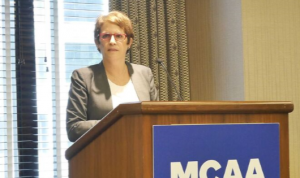 pushed forward again in the future. The DoL Principal Deputy Assistant Secretary for Policy addressed the group and noted MCAA’s participation in several of the DoL procurement-related rulemakings over the past year and a half.
pushed forward again in the future. The DoL Principal Deputy Assistant Secretary for Policy addressed the group and noted MCAA’s participation in several of the DoL procurement-related rulemakings over the past year and a half.
J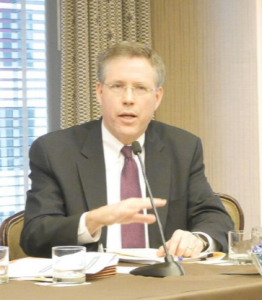 onathan Rees and Sarah Marcus from the DoL Solicitor’s Office and Amy DeBisschop and Bill Isokait from the DoL Wage and Hour Division detailed the new EO13706 Paid Sick and Family Leave regulations affecting direct federal prime contractors and subcontractors. The new regulations will begin to take effect on new contract
onathan Rees and Sarah Marcus from the DoL Solicitor’s Office and Amy DeBisschop and Bill Isokait from the DoL Wage and Hour Division detailed the new EO13706 Paid Sick and Family Leave regulations affecting direct federal prime contractors and subcontractors. The new regulations will begin to take effect on new contract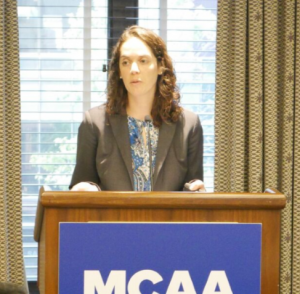 s entered into on and after January 1, 2017. Vigorous discussion of ways to implement that new set of requirements centered on whether covered employers would want to implement the new paid time off rules as individual employers or under a Taft-Hartley benefit plan.
s entered into on and after January 1, 2017. Vigorous discussion of ways to implement that new set of requirements centered on whether covered employers would want to implement the new paid time off rules as individual employers or under a Taft-Hartley benefit plan.
MCAA will be presenting a webinar with the Groom Law Group on the new rules in mid-November. Additional guidance on compliance options will be presented at that time.
The new L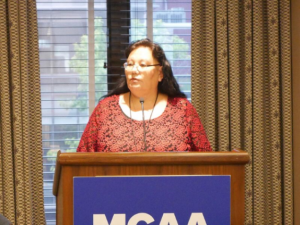 abor Department Mega Construction Project affirmative action program was described in detail by Theresa Lujan, Director of the Mega Project Initiative in the Office of Federal Contract Compliance programs (OFCCP). She noted that 11 of the 37 mega project programs currently in effect involve some aspects of project labor agreements and community workforce development programs.
abor Department Mega Construction Project affirmative action program was described in detail by Theresa Lujan, Director of the Mega Project Initiative in the Office of Federal Contract Compliance programs (OFCCP). She noted that 11 of the 37 mega project programs currently in effect involve some aspects of project labor agreements and community workforce development programs.
Pension Reform
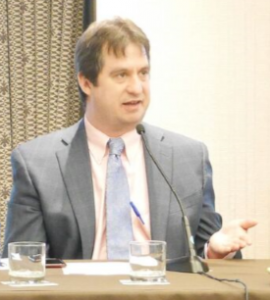 The conference ended with discussions about pension reform, alternate plan de signs and plan liability issues. Josh Shapiro, an actuary, and Malcolm Slee an attorney with the Groom Law group led a discussion session on multiemployer pension plan issues and what legislation and their prospects bargaining parties and contributing employers should anticipate for new
The conference ended with discussions about pension reform, alternate plan de signs and plan liability issues. Josh Shapiro, an actuary, and Malcolm Slee an attorney with the Groom Law group led a discussion session on multiemployer pension plan issues and what legislation and their prospects bargaining parties and contributing employers should anticipate for new 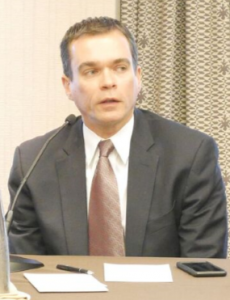 composite plan options, increased Pension Benefit Guaranty Corp premium increases and other specific plan liability developments. Shapiro also discussed pension plan asset return assumptions, developments relating to the use of new mortality tables for actuarial assumptions and a variety of multiemployer plan withdrawal liability issues. Slee discussed prospects for changes to the Affordable Care Act by the new Congress as well as benefit plan implementation of the new regulations requiring paid sick leave on direct federal construction prime contracts and subcontracts.
composite plan options, increased Pension Benefit Guaranty Corp premium increases and other specific plan liability developments. Shapiro also discussed pension plan asset return assumptions, developments relating to the use of new mortality tables for actuarial assumptions and a variety of multiemployer plan withdrawal liability issues. Slee discussed prospects for changes to the Affordable Care Act by the new Congress as well as benefit plan implementation of the new regulations requiring paid sick leave on direct federal construction prime contracts and subcontracts.
If your experience at the 2016 Student Chapter and Mechanical Contractors Summit inspired you to organize an MCAA student chapter, “Starting an MCAA Student Chapter” can help.
The brochure is revised, redesigned and updated to cover all the steps involved in organizing a new MCAA student chapter as well as the benefits of the program to help you recruit members.
The colorful brochure explains:
Following a multi-year tradition, board of directors’ members for the MCA of Connecticut and the MCA of New England all donated generously to the MCAA PAC. Both associations are among the most consistent supporters of MCAA’s PAC and legislative policy initiatives.
MCAA PAC resources will be especially important in the upcoming 115th Congress as our industry will be faced with challenging legislative and regulatory policy initiatives that will require a high profile with decision makers on key industry issues. Gaining access to policy makers on both sides of the aisle concerning our issues will be critical to passage of the legislation we need to keep our industry strong and thriving.
Four new silica safety resources are now available to MCAA members. The resources will help your workers protect themselves from overexposure to silica and help your company comply with OSHA’s new standard… Respirable Crystalline Silica. Affected employers must be in compliance with the standard by June 23, 2017. The resources include a silica safety training video for workers, a pocket guide that highlights the key training points, a 20-question multiple choice test, and a training documentation sheet. To access these resources, please click here. All of these resources are available to you as a benefit of your membership with MCAA.
MSCA announces the release of the Field Service Software Report, fourth in the MCAA Technology Research Series, as developed by JBKnowledge. This report analyzes the current state of service software deployment and helps demystify the process for evaluating and implementing service software in an organization.
The report is based on data collected through a technology survey of MSCA members undertaken earlier this year. James Benham, president of JBKnowledge discussed the report results at a special session during the MSCA annual educational conference held in Scottsdale, AZ. The report explains features and functions members should expect to find in service software and evaluates currently available service software.
Members can download their free copy of the MSCA Field Service Software Report here.
Just prior to the recent MSCA conference in Scottsdale, AZ, MSCA and Convoy of Hope partnered to deliver a tractor trailer of supplies to Chrysalis, a domestic abuse, crisis and counseling center in Phoenix. MSCA Board members and other volunteers helped unload the over 40,000 pounds of needed goods valued at over $40,000. MSCA volunteers then assisted with various landscaping and cleaning tasks at the shelter. Take a look:
During the MSCA conference, spouses and other volunteers also packed over 15,000 pounds of pasta which will be shipped to Convoy of Hope’s Childrens Feeding Programs worldwide. This dynamic group of volunteers did an amazing job working hard while grooving to some great up-beat tunes!
MCAA’s 2016 Student Chapter and Mechanical Contractors Summit drew a record number of MCAA student chapter members, faculty advisors, contractors and local association execs for a Mile-High experience. New technologies, career advice, Student Competition news, a new mini competition format and a fabulous tour of a local brewery made for an over-the-top Summit to remember.
The Summit opened with a Technology Exhibit. Presentations from representatives of four of the industry’s newest and most dynamic technologies were featured, including those using augmented reality and the latest iterations of 3D printing. Attendees tried on, tested, tinkered with and talked about the technologies that they will use in their future career.
The educational program opened with welcome remarks by MCAA President Tom Stone followed by session led by David Hyland and John Santangelo of Trimble who discussed Robotic Total Station, the latest updates in the device and how this technology is being used in the construction industry. Then Timothy Drake, president of the University of NE-Lincoln student chapter, explained how his chapter won the 2015 Student Chapter of the Year and offered some ideas about what chapters could do to improve their chances of winning next year. Jon Finch of Milwaukee Tool led a session that took real-world examples of young people who used social media to enhance their careers but who made some mistakes that ranged from silly to career-terminal! Finch suggested ways for students to avoid such mistakes and how to be social media savvy when using those media to bolster their careers.
Dr. Blake Wentz of the Milwaukee School of Engineering ran the mini competition and presented the project and the background for the annual mini competition—the construction of a college fraternity house. The highlight of this annual event was the game show format similar to TV’s popular “Jeopardy” that involved all the student teams. A combination of teams 3 and 4 won the game and a $50 cash prize.
Career Development Committee member John Powell (San Ramon, CA) announced the project for MCAA’s 2016-2017 Student Chapter Competition—the renovation of a wastewater treatment plant in Chippewa Falls, WI. The project, which is significantly different than its predecessors, will require minimal actual design-build skills and planning It also challenges each responding team to demonstrate their understanding of the profound water crises facing several states and to begin contemplating solutions.
A panel featuring four recent graduates (all of whom were members of the MCAA Colorado State University student chapter) now working for MCAA contractors answered questions from the audience about what they’ve learned since leaving the college and joining the workforce. They discussed the importance of work place chemistry, learning from the “seasoned veterans” and the value of internships as an excellent experience and skills-building tool.
The highlight of the Summit, however, was a tour of the Breckenridge Brewery, a local Denver favorite. Attendees learned how old-world artistry and modern technology combined to make some of the best craft beer around and then enjoyed a dinner featuring some of Denver’s favorite delicacies, including elk burgers.
Next year, we head to Indianapolis for more challenges and networking opportunities.
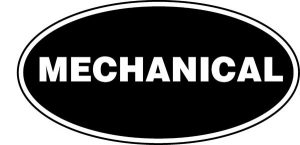 The Mechanical Contracting Education & Research Foundation (MCERF) received a $5,000 contribution from Mechanical, Inc., Freeport, IL. This contribution brings Mechanical, Inc.’s total MCERF contribution to $17,500. President Brian Helm said this contribution is a “…show of support for the the Foundation’s efforts to support industry education, especially those in career development and internships.”
The Mechanical Contracting Education & Research Foundation (MCERF) received a $5,000 contribution from Mechanical, Inc., Freeport, IL. This contribution brings Mechanical, Inc.’s total MCERF contribution to $17,500. President Brian Helm said this contribution is a “…show of support for the the Foundation’s efforts to support industry education, especially those in career development and internships.”
Mark Rogers, MCERF’s President, thanked Brian for Mechanical, Inc.’s support.
For more information on MCERF, contact Dennis Langley (dlangley@mcaa.org).
MSCA is proud to announce a new era as MSCA CONNECT. Only by building lasting relationship and key connections can your company grow and prosper. MSCA Connect will be your “one-stop-shop” for resources and programs to enhance relationships at all levels. Whether it be enhancing the skills of your employees to build a stronger, more qualified workforce; reaching out to other contractors across the country who face similar challenges; building long-term relationships with key industry vendors who are on the cutting edge of new technologies and products; connecting with students and training institutions to enhance recruiting of a talented future workforce or reaching beyond the business world to build meaningful relationships within your own local community, MSCA CONNECT will be there for you.
See what MSCA CONNECT can do for you!
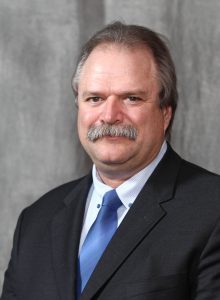 Frank Schaetzke of Pipersville, PA made a personal contribution of $500 to the Mechanical Contracting Education & Research Foundation (MCERF). This brings Frank’s total personal contributions to MCERF to $2,500. Frank is Vice President of National Contractor Accounts for Zurn Industries, LLC. He hopes his support allows “…MCERF to continue its outstanding support of industry education and internships. These efforts really differentiate the mechanical contracting industry from others.”
Frank Schaetzke of Pipersville, PA made a personal contribution of $500 to the Mechanical Contracting Education & Research Foundation (MCERF). This brings Frank’s total personal contributions to MCERF to $2,500. Frank is Vice President of National Contractor Accounts for Zurn Industries, LLC. He hopes his support allows “…MCERF to continue its outstanding support of industry education and internships. These efforts really differentiate the mechanical contracting industry from others.”
Mark Rogers, MCERF’s President, thanked Frank for his support of the Foundation. Rogers said, “Frank is a good friend to the Foundation.”
For more information on MCERF, contact Dennis Langley (dlangley@mcaa.org).
MCAA has released the 2016-2017 edition of its Tool and Equipment Rental Guide. The guide puts the latest comprehensive cost recovery information for commonly used tools and equipment at your fingertips. The single download includes both a PDF version and an Excel spreadsheet. The guide is free as a member benefit.
The rental rates are based on ownership and operating costs for contractor-owned equipment and are derived from formulas and data developed by the experts at EquipmentWatch and from analytic methods used in the construction industry.
Generally, these methods consider the purchase price, depreciation, maintenance and overhaul costs, indirect equipment costs and average annual use hours.
Profit, project overhead and general company overhead costs such as office facilities and supplies are not included in the rates.